
Esta resenha pode conter spoilers
An Unexamined Life
A young graduate (Seo In-guk) doing it very tough in the existential scramble for jobs, has come to the end of his tether. After several years of juggling part-time jobs and not achieving that holy grail — a corporate position at Taekang Group — he concludes that his life has been an absolute failure. From the top of a high rise, he takes the plunge, ends his life, leaving behind a loving single mother and his longtime ex-girlfriend. It is important to note that his despair is exacerbated by a particularly bad day that culminates in a break-up with his girlfriend which he initiates after seeing her with another man. One thing after another he believes that his death is the solution to all his problem and will end all the agony that paralyzes him. That is until he wakes up and finds himself in a kind of purgatorial location face to face with Death herself played by a suitably menacing Park So-dam. This begins a drawn out debate between Death and our protagonist about the value of his life and life in general.I went into this not knowing much except the bare essentials and on hindsight the surprises increased my engagement with the plot. The element of surprise pumps an extra layer of enjoyment as there are plenty of thrills in the offing especially in the first 4 episodes aka Part 1. Be warned: It’s not for the faint-hearted. The crime elements are unyielding in this and there’s bloody violence all about in precarious situations. If violence is no barrier to entry, this can be an amazing adrenaline rush as the viewer embarks on this seemingly convoluted journey of discovery with Yee-jae who reluctantly… and often defiantly takes on each challenge to prove his case.
From the perspective of a seasoned viewer, it’s undoubtedly one of the more creative K drama endeavours I’ve seen in awhile. The plotting here is everything. On the surface it appears to be just another one of those transmigration stories that have become K drama staple but from the way it blends genres, it’s a superior work of art to all the others.
The other highlight has got to be the top tier cast. Plenty of familiar faces and the director certainly used the best of the best to optimize the storytelling. It’s also good to see the underrated Kim Ji-hoon getting a lot more work these days in these bigger high profile productions. But the star of the enterprise is the script begging the question... when was the last time a K drama had plotting this good?
My analysis — best read after viewing and not before… Spoilers ahead.
Somewhere between the third and fourth episodes, it occurs to me that Death’s Game is a darker, certainly more violent reimagining of Frank Capra’s It’s a Wonderful Life. And while we’re at it, why not throw in Charles Dickens’ great classic, A Christmas Carol for good measure? We know which inspired which there. So what do these stories have in common? For one they are second chance stories but the protagonists in these stories aren’t necessarily aware that they are being offered a second chance at the start. They undergo an arduous punishing journey of self-discovery that on the surface is more excruciating than edifying. If Death is to be believed, then Yee-jae is being punished for committing suicide.
But is he, really? Should we really take Death at face value or are her threats strategically made to egg him on to play the game game and force him out of his despondency? Is she manipulating him with reverse psychology. Hell awaits if he fails and it’s a terrifying thought now that he’s seen what it looks like. If punishment is really the endgame, then why take Yee-jae on this journey to solve a matter of grave injustice but to give him a glimpse of what’s life like for those who are left behind? If he was the burden he believed himself to be, why are his mother and ex-girlfriend, Ji-su still grieving for him?
Because the first “body” belongs to the second son of Taekang Group, it signals immediately that these challenges are somehow linked to Yee-jae’s life before death. But how do these pieces of the puzzle fit together? Why can’t he see the forest for the trees? Corporations in K dramas are seldom portrayed positively and yet it seems to be the dream of every university graduate to seek employment in these detached monoliths. Yee-jae attends two interviews at Taekang. The first is a write-off as a result of his encounter with a suicide victim on his way. In the second seven years later he interacts with Park Tae-woo (Kim Ji-hoon) the oldest son and CEO of Taekang Group and mistakenly assumes he has had a positive encounter with his potential employer. It’s an illusion. One of many. Park Tae-woo is a double-faced psychopath with violent tendencies. He’s a fraud. His benign public image is a cover for something far more sinister. He uses his clout as CEO of a corporation with deep pockets to pay off corrupt officials to cover up his crimes. He can use his infinite resources to engage organized crime. He sets himself above the law. He styles himself as Milton’s Satan ruling in hell. No one can get to him. Except through a miracle.
Furthermore the purpose of Taekang Group in the narrative is not only that it represents a festering merciless evil behind the facade of wealth but it is a symbol of a larger critique of materialism that drives the rat race and the participants to despair. The society in which these people live define success in terms of wealth, status, possessions. Yee-jae mentions this more than once that everyone has the same goals — a good job at a large company, marriage, children who do well at school, financial security. The reality however is that not everyone can achieve all of this. Nor might they want to. It is in the interest of these corporations with the help of governments to turn men and women into economic units — slaves of a system that tethers them to the economic engines of the nation with no regard for their spiritual, mental, physical well-being that make up the whole person. Big Business is first and foremost about profits. Governments are about control. They don’t see their clientele or electorates as individuals but entities to be exploited managed.
This perspective is given added merit by the fact that when Yee-jae finally realises that the people around him are more important to him than clinging on to wealth that’s not even his, he finally has clarity about the nature of Death’s game. It isn’t punishment per se but revelations/insights into his life that were not available to him previously. These insights serve a dual purpose insofar as they offer him an opportunity to re-evaluate his life and a compelling reason to exist. He didn’t have much by way of material wealth. In the order of things he was a “nobody” but he loved and was loved. His life had value by virtue of the fact that he was born.
In his case Yee-jae’s depression arose from unrealistic, unhealthy social values that just don’t account for individual differences and the unpredictability of life. Working for Taekang isn’t that pot of gold at the end of the rainbow but it has become a lie perpetuated in his world to prop up a class based social system that devalues the “losers” based on their monetary value. This is also reiterated in the other highlighted suicide where unlike Yee-jae, the individual makes it at Taekang for a while and lives the South Korean dream only for the bubble to burst in middle age when all his accomplishments and attempts to climb up the corporate ladder are rendered meaningless in a single moment. The problem with material possessions is their transience and lifelong pursuit of them is meaningless. Our ability to cling on to them in life is tenuous at best. And no can take it with them when they die.
At the core of this is the question of what makes us human. Are we just mere bodies to be “filled” by a soul? Are we just a sum of our memories? Like in Neo in The Matrix, Yee-jae is able to “download” abilities ie. access the abilities of his “hosts” and use them for a far greater purpose that transcends the lives of any of these morally dubious men. He is able to co-opt their memories for a greater cause — justice for victims of heinous crimes.
Hence the analogue to It’s A Wonderful Life and to a lesser degree A Christmas Carol. Instead of Clarence the angel or the three Christmas ghosts, Yee-jae’s instructor and messenger is the hard task master Death who brings out the whip and cracks it with unholy glee to keep him on his toes. As with the case in these second chance stories, these men come to realise that material prosperity isn’t everything but the relationships, the people we leave behind when we die are the true legacy of our lives. It’s not punishment at all but compassion to be shown how you’ve been led astray and be given another chance to refashion one’s life not governed by the materialistic impulses of our culture.
Esta resenha foi útil para você?

No Honour Among Thieves
Screen productions of organized crime stories seem to have enjoyed something of a revival in the past 12 months. And yes, in most instances criminals are actually organised and savvy. More so than the police I might add. But what they lack in spades — is unity. Unfortunately the prospect of untold wealth does that to people. There's little honour among thieves. Which is something of mixed blessing for the cops at least. Wang Ziqi plays Chu Yihan, a young hot head who becomes embroiled with rival factions of the Northwestern Wolves, a powerful cartel once headed by a mysterious figure known as Gu Mulan. Yihan’s mother, Lin Ke also a cop was sent to infiltrate the organisation years earlier but disappeared along with Gu Mulan. Her whereabouts have been a mystery for 5 years. Yihan along with all her former colleagues are eager to find answers and a resolution to the case but his superiors would rather he leave this matter well alone. Su Xiaotong takes a backseat to the cops and gangsters as folk dancer Gu Linnan or Nana. She’s a peripheral figure for most of those early episodes but it’s only a matter of time before she becomes an unwilling eyewitness to how the family business operates.The Northwestern Wolves were once a force to be reckoned with in the desert region but after a major falling out, every member of the cartel’s leadership went their separate ways. Five years later, one Lao Qiang or "Gun" re-emerges from this low trust environment and what ensues is a cat and mouse game with Yihan and the police right in the middle of the hot zone. Yihan’s mentors and superiors are leery about having him in the hot seat for a whole range of reasons but he is adamant and honestly they don’t have that many options. Wang Ziqi is definitely firing on all cylinders in a role quite different to the one he played in The Imperial Coroner. He would have to as he's surrounded by veterans. Yihan's a bit of a maverick among his peers but shines as an undercover cop. He’s a one-man fighting machine, a cut above most. But more importantly he's quick on his feet (literally and idiomatically), is capable of making stuff up as he goes and adapt accordingly. He's certainly got the swagger and bravado down pat for the role. His superiors are constantly in fear for his life and the guilt they feel about his mother’s absence is acute.
The set-up for his character and relationships with all the men who are potential paternal figures is done in a series of fast-moving action sequences. They’re after a hit man known as Long Qi and his trail leads the cops to a small eatery somewhere among the rocks sand dunes. The road to an arrest in a cop show is seldom smooth sailing. So Yihan and Long Qi are locked into one confrontation after another till he’s safely behind lock and key at HQ’s interrogation room. Yihan is close to Cheng Fan who is his father figure in the force — the man who practically raised him when his mother went deep undercover. He was also his mother’s handler. Cheng Fan has a serious heart issue -- a consequence of a bomb blast. During an investigation into some trouble that Nana encounters, he collapses.
Romance is side dish here and anyone who wants to watch this for that may end up feeling unsatiated. However, that is not to say that romance is unimportant. Instead it is spread thin and works differently within the narrative. Yihan and Nana have more of a fledgling relationship littered by obstacles due to background differences. It feels doomed to be over before it starts. Cheng Fan is pursuing marriage with Mu Xiaowan, a doctor at the local hospital who is also a single mother. Sha Xiaofei, the son of "Gun" is in a very passionate relationship with Yiy, who should be on a catwalk rather than rubbing shoulders with gangsters. In fact, it is fascinating that none of the key females here really fit the milieu. They are inadvertently dragged into the fray because of family or men in their lives. Yet, they have a strong presence in the story because they are positioned as reminders of what normality looks as opposed to violence and the illegal accumulation of wealth.
So what is this show about? On one level it is a treasure hunt. The cat and mouse game is largely over a warehouse of arms and the cartel's long lost booty. That part of the show with the scheming, double-crossing and table-turning reminds me of the US TV show Justified. It's a race to who can decipher the clues to find the loot. On another level, it is a story about family. More specifically a story about two young people who are "chasing for the truth" ie. in pursuit of the past. Nana is looking for her father while Yihan is looking for his mother. It isn't a straightforward road as they disentangle the truth from lies, half-truths and breadcrumbs. There's something of a Rushmon angle to it. Thirdly, it is a morality tale about the corrupting power of greed and its consequences not just on the perpetrators but the people who love them who get caught in the crossfire.
The great thing about this show is that everything that happens matters. The plotting is good. There are no over long stretches of dialogue that go nowhere. Or unnecessary flashbacks. It’s almost shocking that there’s no filler and the impact on the pacing is palpable. Even when I wonder if a scene or a character seems irrelevant, the story eventually arrives at an explanation. The storytelling is reasonably good. The actors are excellent. The collective experiences of the older actors in particular bring some gravitas to some obviously staged moments. Especially the men who are/were part of the Northwestern Wolves in some shape or form.
What's perhaps not as good are the production values. The budgetary constraints are obvious for the most part. There are plenty of desert car chases but no helicopters in sight. I'm not sure about the logistics of all that. But I forgive it shortcomings because I'm used to watching old tv shows and movies. And I'm quite partial to the hand-to-hand fight sequences here as well. No doubt in this kind of action adventure romp that there are occasions when suspension of disbelief is certainly required.
In the final analysis this show is a blast. Each episode is better than the last. It’s a joy for a seasoned watcher of crime telly to be caught off guard now and again but be thoroughly entertained. There’s a certain degree of unpredictability and all kinds of beautiful craziness arise when the cops and mobsters collide.
Esta resenha foi útil para você?

Murmurs of the Heart
By almost every objective metric, The Heart should have been one of the year’s best dramas. In truth it is the best medical drama I’ve seen so far coming out of the mainland. (Although I haven’t seen that many good ones truth be told) The script is meticulous, well-researched and the character arcs are brilliantly woven into the story. But tackling all 38 episodes is likely to be a marathon for many especially in the home stretch. It could have been China’s answer to Hospital Playlist but sadly lacks the latter’s impulse for economy as it inevitably gets bogged down by romances that it arguably doesn’t need. It’s a shame really because the series has a plenty of heart and the relationship among the three leads is one of the show’s bright spots. Moreover the patient stories and their unveiling within the show’s larger tapestry are among some of the best I’ve ever seen.Mark Chao, Jin Shijia, Rachel Mao Xiaotong are the aforementioned leads in this slice-of-life drama a cardiology specialist centre as its backdrop. Mark Chao is Zhou Xiaofeng, a mild-mannered cardiology internist, Jin Shijia (from Under the Skin) is a cardiac surgeon Lin Yi and Rachel Mao plays Fang Xiaoran, an ICU doctor with surgical training. Xiaofeng and Lin Yi are polar opposites in temperament. Lin Yi though a talented surgeon is something of a loose canon and tends to run his mouth. Xiaofeng is a capable administrator but defers a little too much to his ethically challenged mentor. Xiaoran, on the other hand has the best bedside manner of the trio. Unknown to most of their colleagues, Xiaofeng and Xiaoran are half siblings. Their mother is a famous cardiologist Fang Zhuqing who divorced Xiaofeng’s dad when he was a boy. Mother and son are estranged from one another and part of Xiaofeng’s journey is to gradually reconcile with her.
As with all good camaraderie that is forged through fire, opposites clash at first but it doesn’t take long for them to appreciate the other’s skill set and even become a dynamic duo for more complex, multi-stage procedures. Lin Yi’s life is further complicated by the fact that he’s also the primary caregiver of an older brother who is living out the final stages of a genetic heart disease that could also afflict him at any time. It’s the sword that hangs over his head. There’s no cure for the condition but it is that which animates his embrace of medicine and his attitude towards patient needs.
A major chunk of the show is about the inner workings of the cardiology unit from the administrative side of things to inpatient consultations. It peels away the perceived glamour of the profession by featuring plausible predicaments related to short-term and long-term patients who wander around the hallowed corridors of the hospital. Right from the word “go”, it’s clear that the demand for medical services outstrip the supply. Medical staff with all their own personal baggage are overworked to the bone. Yet they are still expected to perform 110% once they put on the uniform. In that light, the drama highlights not only the limitations of medical science as it currently stands but also the enormous responsibility of clinical practice at every level. From inpatient visits to pre-surgery consults and post-operative recovery in the ICU.
In addition cardiac medicine also serves as a recurring metaphor and vehicle for a larger conversation about the importance of community not just among the medical professionals but the patients who temporarily find their place in that place. Medicine is more than a science. Everyone has a story. Strangers who occupy the same space for a period of time form a bond that have important consequences for the future. Some are pulled from the cusp of death while others never leave. But all leave indelible traces behind providing crucial life lessons.
There’s a part of me that is keen to recommend this. The production values are high. The cinematography is excellent and the casting is generally right on the money. However 38 episodes might be a slog for some and more importantly, there aren’t any good subs that I’m aware of. Still if you’re keen on a good heartwarming thoughtful drama, this could be the thing to hit the spot.
Esta resenha foi útil para você?

A Tale of Two Men
Ji Chang-wook returns to crime action in this historical thriller about the South Korean underworld in the late 1990s. He dons the blue uniform as Park Jun-mo, a low-ranking detective co-opted by his superiors to infiltrate an enterprising Gangnam gang operating nightclubs openly and dealing in methamphetamines in secret. He is married to Yu Eui-jeong (Im Se-mi) a fellow police officer who at the start of the show is already an inspector transferring to the security division. As a result Jun-mo is routinely made to feel his place by his snobbish in-laws who are all elite officers themselves. When first approached by the prosecutor-in-charge and his senior, Jun-mo hesitates. But with the prospect of promotion (and respectability) waved under his nose, he eventually succumbs and agrees.Jun-mo’s primary foil is Jung Gi-cheul (Wi Ha-joon) the founder and head of the Gangnam Union. Formerly a popular nightclub disc jockey who grew up in the area, the savvy and ambitious Gi-cheul takes up the offer by a local mob boss to head up his own nightclub. His inner circle consists of a group of friends from high school and their loyalty to him seems unwavering. Not content to be earning chump change, he wants to expand his operations to drug distribution but is flatly rejected by his backer, a notorious figure known as Sgt Jang. Like Jun-mo, Gi-cheul craves respect which he thinks money will bring. He is tired of being trampled underfoot by rich junkies and his direct supervisor so he devises a coup then buys over the biggest mob boss in the country based in Busan.
Despite all the violent blood-letting that’s on display, this is essentially a character study of two men. They’ve been dealt a similar hand at the start but made different choices along the way. Due to unforeseen circumstances, interventions and choices they end up in different places. The proposition that Gi-cheul could have ended up with Eui-jeong is not too far-fetched or that Jun-mo could have ended up as a member of a gang is highly probable. The moral argument (and the show's contribution to the nature vs. nurture debate) seems to be that human beings are the sum of their choices regardless of external intervention.
It's been a while since I've read F. Scott Fitzgerald's literary classic but Jung Gi-cheul bears more than a passing resemblance to Jay Gatsby. Instead of bootleg, Gi-cheul is the purveyor of an item known as Gangnam Crystal. He is the South Korean link in a deadly drug distribution triangle that includes Japan and mainland China. His goal from the first to the last is the girl -- Yu Eui-jeong, a woman he's been in love with since high school. Like his American counterpart, he is the symbol of the South Korean dream. Accumulate wealth as quickly as possible. Gain respectability. Get the girl one way or another. He's a tragic figure in the Gatsby mould and while I never felt the urge to root for him to win, I did want redemption for him.
I didn’t have huge expectations coming into this but this was just one of those unmissable collaborations that don't come very often. A veritable casting coup as it turns out. Our male leads -- Ji Chang-wook and Wi Ha-joon -- certainly lived up to expectations with thoughtful performances as cop and criminal. It's hard to say who was really the protagonist or antagonist. As a whole it was an entertaining emotional rollercoaster experience. The script is serviceable (unabashedly inspired by 90s Hong Kong gangland films) and nothing particularly groundbreaking. Still there are fascinating turns in the plot and implicit repudiations of standard K drama tropes. In the final analysis what elevates this show for me are its presentation of messaging and themes.
In ways explicit within the narrative The Worst of Evil is a Christian allegory about greed, desire and the road to destruction. While the world-building revolves around cops and gangsters playing cat and mouse, at its core is a cautionary tale of two men and their problematic relationship with success — and a particularly narrow view of what that looks like. Both men crave success not for its own sake but in order to attain that Holy Grail of respectability. The desire for respectability propels them forward right to the bitter end. Success, whatever form that takes, opens the door to acceptance by their betters and their peers. Jung Gi-cheul, in particular, is the poster child for this. Raised in the church and at some point a choir member, he would have been schooled in that often misquoted admonishment found in the New Testament. “The love of money is the root of all kinds of evil which while some coveted after, they have erred from the faith, and pierced themselves through with many sorrows.” (1 Timothy 6:10, KJV) His pursuit of wealth in order to gain respectability in a world that values status as well as to win over the woman he loved, kicked him off the straight and narrow. In the case of Park Jun-mo, it is for the love of a woman that he accepts the undercover gig. To shine and abrogate her family's disdain of him. To prove himself worthy of her and to prove them wrong.
The insinuation of Im Se-mi's Yu Eui-jeong into the investigation is a double-edged sword for both men. Even with all the drug talk, she is at the core of this story -- the point of intersection for their trajectories. She is inextricably tied to the desire line of both men. She symbolizes an elusive respectability for both. Nonetheless the de facto love triangle is not a romance but a journey of discovery that the great South Korean dream is not for everyone but a select few. Those who are born in Gangnam don't necessarily succeed in Gangnam. Effort alone don't cut it. Hence the outlook here is bleak and pessimistic.
The drama boasts a stellar ensemble of veteran character actors and promising youngsters . No one puts a foot wrong including newcomer Bibi who turns in a memorable performance as Lee Hae-ryeon the scion of the Chinese distributor. Also of note is Lee Shin-gi as the dagger-wielding Chief Seo, the menacing enforcer of the Gangnam Union. The action sequences are certainly designed and calculated to shock with its relentless brutality. All that contributes to the world-building that harkens back to a different time -- a more chaotic time.
This review is adapted from several posts made on my blog https://40somethingahjumma.substack.com/
Esta resenha foi útil para você?
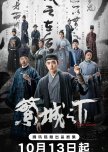
A Dish Best Served Cold
Is revenge justice? That's the recurring question that permeates the gloomy atmosphere of this 12-episode serial whodunit set in the waning days of the Ming Dynasty. This plodding but fascinating tale of wrongdoing and comeuppance is told in flashbacks and largely from the point of view of its present-day protagonist, Qu Sangeng (Bai Yufan), a bailiff of his county’s constabulary. On the surface it has all the elements of a juicy Agatha Christie murder mystery but in and among the dastardly deeds committed in the dark is a document of a civilization on the cusp of collapse. The country’s foundations are rotting and the cracks are showing even in the smaller scale corruption at the local level. It reminds me of the oft quoted saying that "the only thing necessary for evil to triumph is for good men to do nothing." It's been misattributed to Edmund Burke (I've been told) but it still rings true and reverberates all throughout this tale of unsavoury secrets and people looking the other way.The story begins when Qu Sangeng (Bai Yufan) finds the body of his beloved mentor, Captain Leng, strung up in an open field like a scarecrow. From then on the lad embarks on an extensive inquiry into his mentor’s death which doubles up as an exploration of the deceased’s life — his relationships and how he carried out his role as chief of the Hunters Squad. No one likes to speak ill of the dead apparently but the truth is when a man dies in such gruesome fashion, the general rule is that he was privy to some horrifying secrets before his untimely demise. It begs the question: Did his mentor do something he was ashamed of? This thought haunts Sangeng all throughout the investigation while he struggles to maintain some measure of objectivity. On top of that Captain Leng, a husband and father of two, is revealed to have regular night time assignations at a local brothel with a seasoned prostitute (Zeng Li). A part of Sangeng knows that his mentor was prone to cross lines for the job but turning over rocks for a big case is bound to end up in cupboards crammed with skeletons. As Sangeng delves into the rabbit hole of Capt Leng's past, he is led to digging further into a horrific fire that happened 20 years ago where an entire household was burnt to an unrecognizable crisp.
Qu Sangeng's probe into that incident inadvertently results in unpleasant revelations about respectable members of the community. One by one they get picked off almost as if they have knowledge of something sinister in the past that they've taken with them to their graves. Sangeng's journey of discovery is juxtaposed with flashbacks of a lowly but highly intelligent attendant Lu Zhi (Yu Yao) named after his master Lu Yuanbao. Somehow the plight and experiences of this orphan from 20 years earlier is connected to these grisly murders. Yu Yao, who looks like a much younger version of Korean actor Yoo Ji-tae, is charismatic in the role. He carries himself with confidence and exudes a wisdom beyond his years. Bai Yufan last seen in Stand By Me (2023) puts in a solid performance and he's wonderfully supported by Ning Li who plays Judge Song, Liu Yitong as Gao Shicong and Zhang Haowei as Feng Keshui. Since Reborn (2020) I'm always glad to see Zhang Haowei in anything watchable although his role here is relatively small.
No one can accuse the show of mishandled plotting because the script is tight as tight can be. The details are aplenty. Although I understand the intent of the showrunners to plumb the depths of character motivations and spell everything out in large letters, the pacing could be improved by some trimming. Even in a 12 episode drama. As a fan of the genre, I'm in admiration of the intricacies of the narrative with the decent-sized ensemble of characters but no crime show from the mainland ever escapes the mighty hand of social commentary. There's plenty of finger wagging certainly but the show doesn't overtly take sides although it's clear that revenge in the name of justice leads to a high body count that includes bystanders caught in the crossfire.
Esta resenha foi útil para você?

Good Story Limp Storytelling
Ni Ni and Bai Yu helm the deck in action adventure story as they steer a ragtag team into a raging world of secrets lurking on the other side of the legendary Yumen Pass which connects to the Silk Road. It's sand (lots of it), sorcery and sleight of hand as Ye Liuxi (Ni Ni) and Chang Dong (Bai Yu) navigate an alien environment with pals Fatty, Ding Liu and Gao Shen to solve the 2-year-old mystery of the Camelia expedition. At the start of this tale Chang Dong is haunted by the deaths of his fiancee and 17 others who died in a freak sandstorm while he's the sole survivor. Along comes a mysterious woman calling herself Ye Liuxi who is keen to find out who she is and why she's not dead despite being hung out to dry in the desert. Tagging along is Fei "Fatty" Tang who wants in on the action because his antique business back home isn't doing all that well. He's looking for that big score. Ding Liu jumps on the bandwagon on the behest of her godfather a mob boss and Gao Shen is her bodyguard.My first advice is to watch this knowing as little as possible. My second to all who dare venture in to persevere through the first 10 episodes because there is a treasure trove waiting on the other side of all that sandscape. More or less. To my mind a fair chunk of the first 10 episodes are an indulgent waste of television oxygen but it does provide some useful clues that lead to some "aha" moments later. I imagine that this is why the show is unlikely to have broad appeal. .
Aside from the interactions between the leads, the plot is perhaps the best thing about the show. From what I've heard, the story gains its inspiration from the popular Tomb Notes series with more than a few nods here and there to its predecessor. The world building is creative with quite an extensive lore to wade through. The leads and their expanding entourage get the lion's share of development while the show's primary antagonist seem like a cookie cutter entitled second female lead than a truly menacing adversary. I have more than a few issues with how she's written and the amount of power conferred on her in the script. Not to mention that Ni Ni's experience and charisma overshadows that of her drama nemesis.
Further on the negative side the show suffers the same types of problems that most C dramas do. While the secondary romances are quite appealing they don't add anything to the big story. The show also has a framing device of a sort that seems oddly misplaced unless it's meant to keep the censorship axe at bay. Frankly it doesn't otherwise add much to the narrative. Time could have been much better spent on the resolution which in typical C drama fashion wraps up in haste. This speaks to the start-stop-filler-go pacing. Moreover the showrunners don't really know how to properly adapt the source material to take full advantage of the visual medium. This is my continuing problem with C dramas and the way they handle exposition and foreshadowing. That's why I'm a little ambivalent about the main romance despite the fantastic chemistry between the leads.
All in all it's a decent watch with some missed opportunities especially with regards to the final act where so much is crammed into the last few episodes that aspects of the resolution comes across unearned.
Esta resenha foi útil para você?

Casting is Key
The track record of popular anime/manga series being adapted into live action film and tv shows is a checkered one at best. The odds are that of a lottery when an overseas production team puts its hand to the plough and do their “remakes”. So when news spread that this iconic, long-running manga story was being adapted by Netflix, I couldn’t summon much enthusiasm for it. A tiny bit of curiosity perhaps but not a lot of confidence. Still the official trailer gave me the impression that it might not be quite as appallingly awful as Cowboy Bebop was and might even *shock, horror* capture the essence of the source material. Moreover the technology is certainly available in this day and age to do the series justice.It might be a bit of a stretch to say to say that I belong to a One Piece family. But it’s not far off. My offspring follow the manga conscientiously and they’re all up to date with both the manga and the anime. I’ve seen hundreds of episodes of the anime (lost count) and I think the other half is far more ahead of the game than I am. All that to say, we pretty much know the characters and the lore. And maybe I might have something worthwhile to say.
My initial thoughts about this adaptation is that it’s a solid effort. It does a better than serviceable job in adhering to the spirit of the original. It's unabashedly whimsical, goofy and cheesy. And considering the terrible remakes on Netflix of late, this is surprisingly faithful. The casting has to be absolutely one of the highlights. The main characters like Luffy, Zoro, Nami and Usopp are well cast. Everyone in my clan loves the actor, Mackenyu, donning the bandana as Zoro. He couldn’t be more perfect for the role. More than that he seems to know his way around a katana. Or three. Inaki Godoy is rather good as Luffy, capturing his boyish enthusiasm and occasional cluelessness about the realities of life. Sanji is a little on the bulkier side than his anime counterpart but I'm not complaining too much.
One Piece at its core is a superhero-martial arts story where the characters sail around from place to place recharging, making new friends and battling powerful villains to level up. In that regard it’s not unlike a video game. I suspect that Eiichiro Oda was partly inspired by Marvel’s superhero Reed Richards when he designed the original concept of Luffy. In the anime he’s my favourite because he keeps me reliably amused. Furthermore the series demonstrates that it is well-acquainted with the golden age of piracy. As the Straw Hats’ notoriety reach newer heights, the greater the bounty on their “wanted” posters. It has a strongly libertarian streak running right through it and the pirates are the epitome of that spirit of freedom, for good or ill. Not all are ambassadors of goodwill like the Straw Hat crew and certainly not the dubious World Government which is the arbiter of law and order in those turbulent waters. Part of what the Straw Hats do is help inhabitants of these islands and villages regain their autonomy from minor and major tyrants taking a leaf out of the book of twentieth century dictators.
The decision to make the look and feel of this enterprise quirky in the manner of Tim Burton pays off here. Though Eiichiro Oda draws on historical events and figures, the One Piece universe is still a fantastical world where good versus evil is centrestage to some familiar locations populated by a parade of mythological races, bizarre personalities with the most unlikely abilities. There’s a sense that Alice has fallen down the rabbit hole one more time and it’s a brave new world that seems inviting on the surface but harbours a foreboding savagery in its underbelly.
Aside from the pacing, my other nitpick with this is the lack of spectacular rubber Luffy moves. While they’ve kept his personality more or less intact, his fight scenes don’t seem as exuberant or hilarious as they are in the anime. This is always my biggest beef with adaptations — the humour and action sequences don’t always transfer over well. That said, Luffy’s most important asset as it were, is his ability to inspire loyalty and affection everywhere he goes. Despite being on the naive side, he also has an uncanny ability to surround himself with the right kind of people and see past the facade. It is an achievement in and of itself that he is able to bring an arrogant loner like Zoro and an untrusting cynic like Nami into the fold despite all their protestations. The fact that the live action is able to bring that crucial factor to the forefront does check off a very important box.
Obviously the fact that the mangaka onboard is a producer on this is why this project hasn’t been a disaster. The most illogical thing they could do in the current climate is to disrespect a beloved IP and antagonize generations of fans worldwide in order to appeal to a politically correct crowd. No production house in their right minds would do that, surely?
Esta resenha foi útil para você?
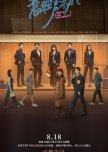
When Elvis Met Elvira
Can anything good come out of MangoTV? Occasionally perhaps and this gem seems to be one of them. I don’t think it is hyperbolic to say that this is perhaps the best rom com I've seen in a long time... in the vein of When Harry Met Sally but more grounded in real world issues. Both leads are upwardly mobile hardworking outstanding professionals in their respective workplaces but circumstances are such that they are stretched to their limits. They live precariously on the precipice as they maneuver the snake pits of corporate culture as "slaves" to their masters' bidding due to the necessity of holding on to their jobs where nothing is ever a guarantee. It's highly realistic in the way it depicts the dog-eat-dog work environment that's all too familiar to struggling wage earners in the East Asian context. In reaction to this global phenomenon there’s been plenty of talk about the Great Resignation or quiet quitting in the past few years. Gone are the days where a person remains in the same job, profession, industry for their entire working life. This drama reflects that harsh reality of a competitive labour market in the everchanging contemporary economic landscape and the need for adaptability. While it satirizes the milieu that it explores, it is at its core a sympathetic exploration of the men and women who live in the coalface of workplace grind.Elvis Han and Elvira Cai headline this office drama where romance is assumed to play an integral part of the work-life realities that afflict many overworked employees today. So how do people find time for courting and wooing in this day and age where men and women work long hours, barely have time for meals, are exploited by the employers competing with other employers for contracts and clients? It's a battleground out there and many are not past dirty tricks to gain the upperhand. A fact that inevitably spills into relationships with significant others.
Elvis Han's Xu Ziquan is an investment banker and for him, a rising star in the industry, it's the neverending chase for that next big deal that's giving him sleepless nights. He looks genuinely exhausted. (I suspect Elvis Han was nursing a cold for most of the shoot) If he can't clinch it, it's reallocations and retrenchments for his team. He meets Tang Ying (Elvira Cai) onboard a plane for the first time and the sparks are ignited. She's a corporate lawyer at the bottom of the food chain barely keeping her head above the water with a demanding supervisor on her back 24/7. She piques his curiosity during their brief exchange and apparently the feeling is mutual but neither expects to see the other again. Of course they do first through her sister then later they work together on a crucial M & A project. The two first decide that they are best suited to be friends and drinking partners in part because she has heard of his (overblown) reputation with women and in part because he is a bit of a commitment phobe. As they start to spend more time together, they begin to rethink their "friendship". Indeed can their "friendship" transition into a "dating relationship"? Not without a few bumps and wake-up calls along the way.
The push and pull is rather well done here and never goes overboard to the point of frustration. Work does get in the way. The leads are busy putting out fires on the one hand while rubbing shoulders with a whole host of potential obstacles to true love — acquaintances, colleagues, and clients. There are plenty of opportunities for them to look elsewhere and keep their options open till kingdom come but in the end they keep finding their way to each other regardless of admirers and ridiculous schedules. There are troublemakers strewn along the path of true love but once the main pairing make their minds up, they are a team in the making. Nonetheless what the series does even better is the way it deals with accommodation. With all the different kinds of relationships on display the narrative acknowledges that seeking companionship and making families is not only a human impulse but clearly constant negotiation is necessary to solidifying long-term relationships. The leads may tease and make jibes at one another but their conversation also have depth and thoughtfulness that show their commitment to each other.
There’s an important side story with Tang Ying’s sister Xinzi who is in search of the perfect mate that will check all the right boxes. It’s a long hard road for the spoilt princess type but through her experiences with a few men she comes to conclude a few home truths on her own.
The best thing about this is the script although it’s undeniable that the chemistry between the leads is fabulous and the direction is classy. The tension, the UST, the build-up is great. The dialogue more than anything else just sparkles especially during the banter between the leads. I find myself grinning from ear to ear as I watch their antics. Of course it’s even better in the Chinese. In a romantic comedy the repartee is almost everything. More than that however is the way the leads and their arcs are written. Tang Ying and Xu Ziquan are relatable people dealing with all the same kinds of issues that the rest of us know only too well. He’s no prince and she’s no Cinderella. They just want in on their piece of the pie. To make their mark in a complex world where they’ve been fed lies about their real priorities. They have their strengths and their flaws. Because they are decent people they try their best to get on with everyone even their bitterest rivals and sometimes it means they can’t say no. Sometimes it means that people who can’t take no for an answer take advantage of their good will.
All in all, it’s a wonderful 14-episode drama that isn’t driven (or hampered) by the usual incoherent adherence to romance tropes that plague a lot of rom coms in recent times. Moreover the length of the drama speaks volumes as to why this one is a cut above the rest.
And the OST... is outstanding. Just like When Harry Met Sally.
Esta resenha foi útil para você?
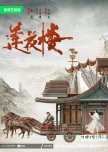
Humorous Hodgepodge of Wuxia and Murder
A title of this nature pretty much speaks for itself. A humorous hodgepodge of wuxia action, politics and murder mysteries starring Cheng Yi, Joseph Zeng and Xiao Shunyao as an unlikely trio travelling around the martial arts world (jianghu) for various reasons. Cheng Yi’s character Li Lianhua aka Li Xiangyi is looking for the remains of his beloved senior, while Joseph Zeng’s Fan Duobing is aiming to prove himself to Baichuan Yuan, the Pinkerton detective agency of his era. Xiao Shunyao’s Di Feisheng however wants to have a final showdown with Li Xiangyi so that he can say fair and square that he’s the No.1 pugilist of his era.Cheng Yi puts in a terrific performance as Li Lianhua (lotus) who was formerly known as Li Xiangyi, a master swordsman, the founder of the Sigu Sect. At the start of the drama Li Xiangyi has taken on the persona of Li Lianhua (lotus), a wandering physician with a reputation as something of a miracle healer. This moniker isn’t entirely without foundation. He is a skilled doctor in his own right but more importantly, a shrewd observer of the human condition. The glibness with which he tells lies is at times astonishing. This combination makes him a highly effective sleuth in the vein of the world famous resident of 22B Baker Street. Early on he encounters Fang Duobing who is eager to traverse the length and breath of jianghu away from the all-protective eye of his aristocratic parents. The two cross swords at first sight and bicker a-plenty until Di Fengsheng enters the picture wanting a rematch. The ignorant lad, mercilessly lied to by his companions, fails to notice that he’s among giants in wulin, is quick to direct his wrath against the surly newcomer who looks upon him with the same contempt Goliath looked upon David. Soon the caravan that Li Lianhua travels around in with his trusty doggy Fox Spirit becomes rather crowded.
To be honest it took me some time to warm up to Joseph Zeng’s Fang Duobing who at first seems to be combative on impulse. Some of that was warranted because Li Lianhua plays up his trickster persona with impunity — spinning tall tales at the drop of a hat trying to conceal the true state of his health and his former identity. It’s all quite amusing as he’s at the receiving end of a lot of dramatic irony. Nonetheless the lad has an inkling that Li Lianhua might be holding back. However a lot of Fang Duobing’s hostility towards others comes across like a rather bad case of the terrible twos — picking fights unnecessarily and out of what can only be interpreted as jealousy when others were partial to Li Lianhua. Still he has a decent growth arc and by the time the final showdown takes place most of his bad habits are a thing of the past. At the start he comes across as a bratty rich kid running away from home utterly lacking common sense. After undergoing a series of experiences with Li Lianhua investigating all kinds of murder mysteries, the belligerent newbie grows up enough to be worthy of a princess.
Joining them now and again is Di Feisheng (Xiao Shunyao) leader of the Jinyuan Alliance which is gradually being taken over by his obsessive proxy Jiao Liqiao and her minions. Her goal is to be kingmaker and rule by his side as his bride while he has less romantic notions in mind. It isn't long before he discovers that Jiao Liqiao is a serious and maddening obstacle to his personal aspirations. While all the plotting and scheming is going on in the background, the banter among the trio injects levity into the landscape of murder and mayhem without diminishing the stakes. More than once Di Feisheng comes to Li Lianhua’s aid during the rough and tumble of sleuthing in the tumult of jianghu.
There’s no doubt that Cheng Yi is born to play this role and any role in this genre. He’s an expressive actor who is capable of nuance. His elegance in executing fight scenes is one of the show’s highlights. He certainly knows his way around a sword. That said, the star of the show has to be the screenplay which does an excellent juggling act of pulling all the story threads together at the end for the show’s final showdown with the villains of the piece.
To my mind the second half of the show was better than the first which is why in the end, this is an 8.5 out of 10 for me. In those early days Fang Duobing did grate on my nerves and there was a fair bit of clumsy investigation going on while he blundered his way around the china shop. I also think that the puzzle hunt though fun (and perhaps necessary to stress the gravity of what’s at stake) lacks polish, and made matters more complicated, leading to more deaths than necessary. That awkward plotting I suspect was in service of a major reveal at the end.
Despite criticism I may have of this, it was a good watch and I could never accuse this show of inducing boredom. Cheng Yi is certainly a stand out and I ended up really appreciating how all the moving parts came together in the end.
Esta resenha foi útil para você?

A Cliche Story Done Better Elsewhere
In an era where C dramas are falling off the production line faster than most of us can keep up , thirty-something hours of your time could be better spent on a show of better quality. The curious part of me would love to know what it was that they were imbibing in the writers' room when the script was cobbled together. (From an existing source material no less) Or smoking for that matter. There are plenty of problems with this production starting with the amateurish screenplay which was meant to provide the backbone to this. The Legend of Anle claims to be a revenge/justice story centred around a highly intelligent accomplished young woman who does a Count of Monte Cristo turn. But the showrunners don't seem to understand rudimentary storytelling much less the visual medium of television for that claim to be convincing. For instance we are persistently hit over the head with the message that our protagonist here is brilliant. Indeed she's happy to brag that she's got the whole thing sewn up because she's the best thing since pork dumplings. Her schemes are nothing to write home about and several are reliant on the stalwart Han Ye (Gong Jun), the crown prince to be on board. When she's busy doing the heavy lifting, the other leads are hiding in the background watching her work and providing running commentary. I like Gong Jun enough to persevere. His character was brimming with potential. But I too think he wasted his time on this fiasco of a production.It's not hard to see where the problems lie even in those early episodes. While historical dramas pandering to a younger demographic are nothing new, there's a dreariness that hovers over this production that makes watching much of it a slog. Even Dilraba's flirty girl boss pirate act as she bursts into the scene comes with a dose of cringe. Things like that while mildly amusing at times breaks immersion and doesn't bode well for what comes down the pike. The show does nothing more that better revenge/justice stories have achieved on a larger scale with far more thought put into them. It has the bad habit of recounting events through dialogue where key events occur offscreen. What's worse is that some characters are just there to instruct the audience on how a scene should be understood or how another character feels. The job of these side characters too is to hit us over the head ad nauseam with how much the leads are in love with each other and it's a pity that they can't be together. This certainly shows a lack of confidence by the director in the performances and the script to convey the most fundamental story threads with spoon feeding.
All in all it's a strange start, stop, drag experience. One that I don't recommend. You can certainly do better elsewhere.
Esta resenha foi útil para você?

Road to Nowhere
Do I really need to see Jing Boran change a light bulb? That’s just one of many niggly questions that comes to mind as I plod my way through Road Home with a gnawing itch to drop it. It’s a lovely angle of him to be sure (as any would be) and perhaps the audience has missed the point that Tan Songyun’s character Gui Xiao is absolutely enamoured with Lu Chen when she fixes her adoring eyes on his strapping figure as he does what most men worth their salt can do at the drop of a hat. When Li Xian changes light bulbs at the boarding house in Meet Yourself, there are multiple reasons for it. It tells us something about the ubiquity of his character. It shows that he’s a handy fellow. It was yet another bit of confirmation that he was the heart and soul of his village — a one man economic engine. But when Lu Chen is swapping out light fittings, it feels like the director and/or script writer don’t really have any idea of how to integrate all of the elements around the romance. Which is the general feeling I get as the “story” progresses. It’s like watching a reality travelogue that I didn’t sign up for. The thing is, the light bulb scene is meaningless here because it doesn’t tell us anything we don’t already know about Lu Chen. The guy is a bomb disposal expert. What’s a light bulb when there’s an explosive device with a complex web of wiring about to go kaboom? Road Home is a show that should be watched at 1.5 x or 2 x speed or not at all. Which leaves me with a conundrum: Jing Boran’s alluring sonorous vocals gets lost in translation.On paper, Road Home should have the potential to be equally effective but the mistake is putting an obvious conflict-free romance at the centre of the story. Except for the godson, none of the other characters have interesting arcs of their own. Worse still they feel disconnected. Their sole purpose is to dance around the leads and support their journey as they inevitably pair up. I’m about 15 episodes in and I still don’t find Gui Xiao a compelling character in her own right. Lu Chen gets to do all the exciting cop stuff while she panics around in the dark wondering if he’s going to live to see another day. It’s by the numbers. There’s no curiosity about any of the characters and how they get to the point that they do. 30 episodes is just too long for a show where there’s so little build up or suspense. By the time the leads tell us that they’re tying the knot, most of the key reveals have come and gone.
It’s a mistake to think that slice-of-life dramas have no plots. (Or meander aimlessly without one) They do. And the really good ones do such a good job of juggling multiple threads that those who watch that the balancing act is actually easy. Part of the problem too with Road Home is that Lu Chen’s SWAT activities are far more interesting than anything else in the show. Consequently I inevitably come to this conclusion about these types of police procedurals — they are veiled recruitment propaganda. Ad campaigns for law enforcement because no one in the their right mind would sign up for SWAT and EOD without overt prodding and/or flag waving. It’s one thing to insert propaganda in a crime show, it’s another in a romance. It’s deadly.
Esta resenha foi útil para você?

Bo ra! Deborah: Uma História Agridoce
1 pessoas acharam esta resenha útil
Watchable Rom Com Falls Prey to 11th Hour Problems
Having Yoo In-na and Yoon Hyun-min spearheading this was a major incentive to jump on the bandwagon. Especially Yoo In-na who is so much at home in rom coms. So after skipping ahead for a sneak peek, I decided that this might be fluff worth wasting time over. I was sold after watching Episode 3 and my heart went out to a very humiliated (and devastated) Bo-ra who was being mercilessly gaslighted by her ex and social media.This show covers plenty of subjects close to my heart — the complexities of courtship, marriage as well as differences between the sexes. Not everything works for me but there are nuggets of gold everywhere and the gleam of gems even when episodes don’t light up. What’s become evident is that Kdrama rom coms are gradually turning into parodies of the genre which would account for the histrionics, hijinx and odd foray into toilet humour. This accounts for why the genre that catapulted SK dramas to international glory have become very hit and miss. Here there’s a dual purpose in that because the show needs Yoon Hyun-min’s character Lee Su-hyeok to see the very worst of Bo-ra and still somehow manage to fall in love with her. Why? Because everyone defaults to hiding behind masks and facades in public. In a society where status and respectability holds incalculable currency, one’s public face may bear little or no resemblance to one’s private realities. This fact has ramifications for how dating and marriage is viewed in the wider population.
The first 7 episodes are a mixed bag. Some segments contain sparkles of brilliance and insight into the fallen state of humanity while others leave behind the sour aftertaste of second-hand embarrassment. The lifeline during those moments are the leads’ banter which is always a delight to behold. Whatever the show’s flaws there’s no doubting the quality of the dialogue. But from Episode 8 onwards when Bo-ra finally bids the duplicitous ex-boyfriend farewell and the leads share an intimate moment in a karaoke booth, a switch in the show’s engine is turned on.
By about the third or fourth episode it becomes clear that this show is about endings. The end of a relationship doesn’t have to be the death knell to one’s existence. It can be the beginning of something else. Perhaps something better than what came before. Out with the old, in with the new. Hence the jalopy vs Mercedes analogy that is referenced in Episode 11. The very best part of this show is reserved for the leads and rightly so. From the first they are set up with parallel journeys and in walking together, groping around for answers, their eyes are opened to what’s been there all this time. The ending of a relationship doesn’t have to be a tragedy regardless of how it ended.
It occurs to me that this story really begins with the exes — Ju-hwan and Yu-ri. The leads are going on their merry way more or less maintaining the status quo. Bo-ra who is the talk show queen of dating and author of three books on the subject gets mugged by a rude shock when she finds out that not only was Ju-hwan messing around with a close family friend on his busy days, he had long since given up on their relationship. In his words, he felt smothered by Bo-ra but I’m inclined to think that in his case there’s a lot more than that. Yu-ri on the other hand was fed up with Su-hyeok’s reticence and was already looking elsewhere for security and solace.
Infidelity, an immoral act, is usually an expression of a much deeper problem that hasn’t yet been laid bare. It’s also a case of wanting your cake and eating it. A lack of communication is often blamed for break-ups and no doubt that plays a integral part. However, it goes much deeper than that. The death knell of a relationship is the consequence of unspoken, unmet expectations much of which are unrealistic.
The show swims along nicely for about 5 episodes and then it falls apart with the last two which are almost a reversal of what transpired in the two preceding episodes.
Do I really want to know what was in the kimbap or fried chicken in the writers’ room when ideas were being pitched for Episodes 13 and 14 of Bo Ra! Deborah / True to Love? I was fervently hoping that they wouldn’t screw up the resolution but alas they just couldn’t help themselves. Episode 13 in particular aroused something in me that few dramas are capable of doing. It made me want to punch the screen. What the show did to Su-hyeok’s arc in particular was sloppy and asinine. All in service of a push and pull that had to be until about 10 minutes before the end. It was a resolution in search of a conflict… and a villain. And even now I’m puzzling over who that might be.
Is it the insufferable Ju-hwan — the pompous egotistical ex who was caught red-handed cheating on Bo-ra? He seems to be the front runner. The classic bad guy and the quintessential obstacle to true love and happiness. The guy has no shame and the show is shameless in exploiting the very worst aspects of his personality. Or is it the gutless wonder that is the male lead who somehow loses his nerve when the destable Ju-hwan confesses on public radio that he wants another chance with Bo-ra. So what does Su-hyeok do. He caves. Accordingly Su-hyeok backs down from a fight because he says during a drunken stupor that he “doesn’t want to be the bad guy in somebody else’s romance”. It’s easy to believe that someone else wrote Episode 13 because the Su-hyeok in the last two episodes underwent a brain or personality transplant. He became a different man. In my exploding head I can just hear Jeremy Northam’s Mr Knightley saying to Gwyneth Paltrow’s Emma. “Badly done, Emma, badly done.”
Another candidate for villain here might be Bo-mi who sinks to new lows in terms of churlishness and stupidity. Gee “Sister, thy name is gaslighting” was out in full force. I’ve never liked Bo-mi who has never been much of a presence in this drama but all that defensive tantrum throwing in the final episodes is very hard to watch.
In a way I’m glad that I didn’t invest weeks on this show only to be left feeling vaguely defrauded by the production. To put a positive spin on this I can see how the show runners who are tethered to the ratings system are terrified of the leads coming together too early because the complaint has traditionally been “oh the show is not interesting once the leads come together.” This kind of thinking has incentivized bad endings more times than I can count with two hands and ten toes. A moderately good show can’t have a clunky ending because a clunky ending has a detrimental effect on the entire shape of the narrative.
Adapted from two posts from my personal blog.
Esta resenha foi útil para você?

Fantasy Healing Fable
I will preface this by saying that this is in all likelihood the best drama I’ve seen all year. By a strong margin. It’s certainly one of the best I’ve seen in the last 12 months. Until Shards of Her, I hadn’t watch any Taiwanese dramas in several years. Yet in the last couple of months, I’ve discovered a treasure trove of good shows. This is perhaps the best one with the widest appeal. While it has whodunit elements, there’s no gore or violence to deter the faint-hearted. It’s a gloriously perfect blend of coming-of-age, fantasy, a touch of horror, detective and family drama. The weakest part I’d say is the police procedural side of things occasionally played for laughs (which doesn’t help especially from the perspective of a seasoned watcher) but all is quickly forgiven because this show is driven by great storytelling and is imbued with plenty of heart. It’s the kind of show that the Koreans call a “healing drama”. Which usually results in an outpouring of eye water once the waterworks are turned on. Good grief. I don’t remembered the last time I cried this much in a drama.The star of the show is Pu Yiyong played by Tseng Jinghua, an underachieving high school graduand whose only talent is calligraphy. It’s hereditary. His grandfather is a renowned calligrapher and a teacher in the art. But that distinct family trait has a habit of skipping a generation. Calligraphy however is a dying art form, quickly being superceded by technology. On the other hand Yiyong’s only ambition is to be a comic book artist after completing high school. One day on his way to a calligraphy competition, Yiyong, his father and grandfather board a bus which unfortunately falls prey to an incoming airplane. The lad survives but wakes up after being comatosed for over 2 years. His grandfather barely makes it and is still unconscious in hospital even after all that time. It is left to Mother, Ye Baosheng (Cheryl Yang) to pick up the pieces.
While time has moved on and everyone else with it, Yiyong is lost at sea with no paddle. Or map. Metaphorically. He has no idea what’s next for him until he becomes entangled with supernatural beings who insist that they need him to settle unfinished business on their behalf. So an almost 20 year old unemployed Yiyong reluctantly takes on “cases” that contain at their heart a riddle that needs to be unravelled. Enter Chen Chuying, a junior police officer (Vivian Sung) to lend him a helping hand and takes the lion’s share of the credit for clearing up these mysteries in front of her colleagues. Still cracking these cases is a team effort. Along for the ride is former schoolmate and med student Cao Guangyan (Peng Cianyou) who coincidentally moves next door with his dad (Mario Pu) when Dad’s days in publishing comes to an abrupt end.
Yiyong becomes a reluctant sleuth as he wrestles with his own future and the loss of his father which has left a gaping wound with guilt at the centre of it. He has nightmares that he can’t make head or tail of. There’s also a shadowy figure in the background determined to test his mettle at every turn. Unlike others who have come before, Yiyong is a reluctant superhero. He would rather get on with life and not be haunted by beings that only he can see. Until he starts drawing them that is.
On a deeper level, like many crime shows, this is about the forgotten people in our communities. Those who have suffered loss. The lonely. The homeless. The victims of crimes. This where the show tugs at the heartstrings effectively. The rollercoaster of emotions that I feel in this comes only very rarely. Beautifully intertwined with all of this is also the message that everyone has something that they’re good at. Even a designated “loser” by current social standards can contribute in unexpected ways. Academic smarts aren’t the be all and end all. Everyone has a part to play in the social engine regardless of social status, education, smarts or rank.
This journey of course isn’t Yiyong’s alone. Chen Chuying and Cao Guangyan, his so-called “superiors” who accompany him have a lot to learn from him as well as these out-of-this-world experiences. Chuying understandably is desperate the climb the ladder and break glass ceilings in the police but is forced to confront her own motives for wanting to a respected detective. And Guangyan, for once in his life doesn’t have all the answers regarding his future.
I am new to most of the cast and Tseng Jinghua who leads the cast is definitely brimming with potential. He brings the right balance of confusion, grumpy frustration and a reluctant compassion to the role. Despite Yiyong’s brusque demeanour Tseng Jinghua manages to keep him relatable and likeable.
To give credit where it’s due, I leave my highest praise for the script and by extension the writer. It’s the kind of story that could easily lose its way or get derailed by all the moralizing but unlike many others it’s unusually disciplined by keeping the main thing the main thing. The result is a coherent piece of storytelling which is undergirded by a surefooted direction. Once it takes off it never falters. Furthermore they also manage not to butcher the finale in order to leave the door open for another series. Which is entirely doable if the will (and a decent script) is on the table.
Esta resenha foi útil para você?
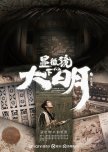
A David and Goliath Story
Who doesn’t love an underdog triumph over the odds story? I don’t know how this gem almost eluded me but a show that features men with beards squabbling over the technicalities of the legal code is likely not to be everybody’s cup of tea. For me however this 14 episode series is a rare combination of smart, heartwarming, hilarious and just plain fun. It has me on the edge of my seat from start to finish. Moreover the courtroom drama (and there are a few) in the final two episodes of this is an exemplar of entertaining theatre.Set during the waning days of the Ming dynasty, Zhang Ruoyun is the neurodivergent Shuai Jiamo who has a knack for figures. His obsession with the accuracy of his calculations especially in the distribution of land leads him and his best friend Feng Baoyu (Fei Qiming) down a rabbit hole of bureaucratic mismanagement and corruption. The Central Plains is a large place. The country’s capital located some distance away relies heavily on diligent and even honest officials to ensure that the people are flourishing and everyone’s paying their fair share of taxes so that the world can go on spinning. All this assumes that officials picked from the country’s intelligentsia are worth their salt and are content to humbly “serve the country”. However when the cat’s not looking, the mice get up to mischief. There’s never enough money so they collude with the gentry to defraud the uneducated peasants and increase their pieces of the pie over time hiding behind layer upon layer of red tape with all kinds of mutually beneficial trade-offs.
Ultimately the war on corruption is not fought with weapons of steel. There are plenty of weapons showcased (including a large leg of ham) but the biggest one is likely to be red tape itself. It may be used as an impediment to truth. But in the right hands it is also the salvation of the show’s protagonists. Wielded by a knowledgeable soul with conscience, it can be a tool that holds back the forces of evil to great effect.
The tragedy though is that truth and justice is the last thing that matters to most in this fray. There are fascinating modern parallels here. No one really cares that 1+1=2. In fact 1+1=2 can become 1+1=3 at the whim of a corrupt educated class determined to push forward their own agendas on an unsuspecting populace. It’s akin to Winston Smith at the end of Orwell’s 1984. If the powers that be can make you state a lie as truth, it can make you do anything.
Shuai Jiamo is the outsider in a world of competing agendas. He’s suffering trauma from an event 20 years earlier that saw him orphaned. He is the age old oak tree that stands in the midst of the storm. Immoveable. Incorruptible. A challenge to the status quo. His role in the story is to bring to light all the man-made complexities caused by a web of self-interest. His simplicity is a bulwark against the complexity. Nonetheless he can’t do it alone. He needs his friend Feng Baoyu and frenemy lawyer Cheng Renqing (Wang Yang) to help him address a wrong that has implications beyond 1+1. It is a telling indictment not just of that world but ours that the truth matters very little but boils down to how one is able to prosecute one’s arguments in such a way as to negotiate trade-offs and mutual benefits.
Without saying, Zhang Ruoyun is terrific in this and he can be relied on to pick intelligent scripts. He also has a penchant for playing quirky characters. The presence of Wang Yang is usually also a guarantee of a quality production. The other faces in this are rock solid even the youngish Fei Qiming (not exactly his first outing) really comes into his own in those last two episodes. Others will recognize Wu Gang who also co-starred with Zhang Ruoyun in Joy of Life and Zhang Fan who seems to be in every other project that I watch.
The production values are great apart from the usual obvious editing misdemeanours. It's a testament to the quality of the direction that a show that's based on palace politics and bureaucratic red tape can be as enjoyable as this.
[This review is based on one on my blog.]
Esta resenha foi útil para você?
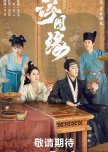
Royal Romp Best Served with Humour
Chen Yuqi and Dylan Wang are delightful pairing as a imperial consort and eunuch respectively in this faux historical romantic comedy. It is a quirky mix of genres that don't always blend well especially in the final phase of the drama, where the show feels like it outstays its welcome. The show is at its best when it doesn’t take itself seriously and remain within its comedic purview.The series starts off with plenty of hilarity as Chen Yuqi’s Bu Yinlou attempts to survive the rough and tumble of palace machinations using her wits. She’s an inveterate gambler and manages to get extricate herself from various problems sometimes with the aid of Dylan Wang’s Xiao Duo, a supposed eunuch in charge of Zhaoding Bureau and other law enforcement agencies. The leads are suspicious of one another’s intentions at first but later become allies and eventually lovers. The banter between them is a hoot especially when they misunderstand each other and there are many laugh out loud moments in those early days.
The pair inevitably find themselves in a love triangle with the recently crowned emperor Murong Gaogong (Peter Ho) whose obsession with Yinlou is… incomprehensible all throughout. He evolves from being a timid prince to a raving paranoid megalomaniac — a caricature rather than a fully fleshed out character. Even when he finally finds out that Yinlou and Xiao Duo are doing the hanky-panky behind his back, he reactions are insanely pathetic. He barely knows Yinlou except for a brief childhood encounter and yet he expends all his energies in obsessively holding on to her to the point of absurdity. As a result of not having his way with her, and suffering one disaster after another he spirals into self-destructive madness. Even though he suffers the fate of all cuckolds, there’s not a lot that’s sympathetic or likeable about him. Instead he is primed as a figure of scorn.
Where the show goes wobbly is when it tries to be serious and soapboxes about the freedom for individuals to choose within the palace walls. Theirs is a forbidden love but Yinlou seems an unlikely mouthpiece that speaks truth to power. The downside to this is that it takes one right out of the experience because let’s face it, nobody cares anything about individual freedom in the days of emperors. Luckily for them, the leads have the intelligence and enough friends to help them with Yinlou’s jail break. But by then, one has had a gutful of a very deranged monarch whose grasp on reality diminishes daily. Where would the opinionated leads be if they had no brains? Dead, would be one possibility. Or contentedly living out the rest of their lives in the palace eating and drinking from the emperor’s table grateful for not being dead.
In some ways I’m surprised that this got made. Or that it even got past the scissor happy censorship with as much as it did. Many of the passionate scenes purportedly got the chop and yet when Yinlou slaps the emperor she gets away with it. Her statements railing against his tyranny are far more radical than all the snogging between the leads. Perhaps it’s the low budget nature of this beast. I can only speculate that those who let this pass think somehow that hardly any one will be watching this and an emperor who is over-the-top crazy can’t possibly have any modern day parallels.
All in all, it’s far more enjoyable when one suspends all manner of disbelief.
Esta resenha foi útil para você?

 3
3



















